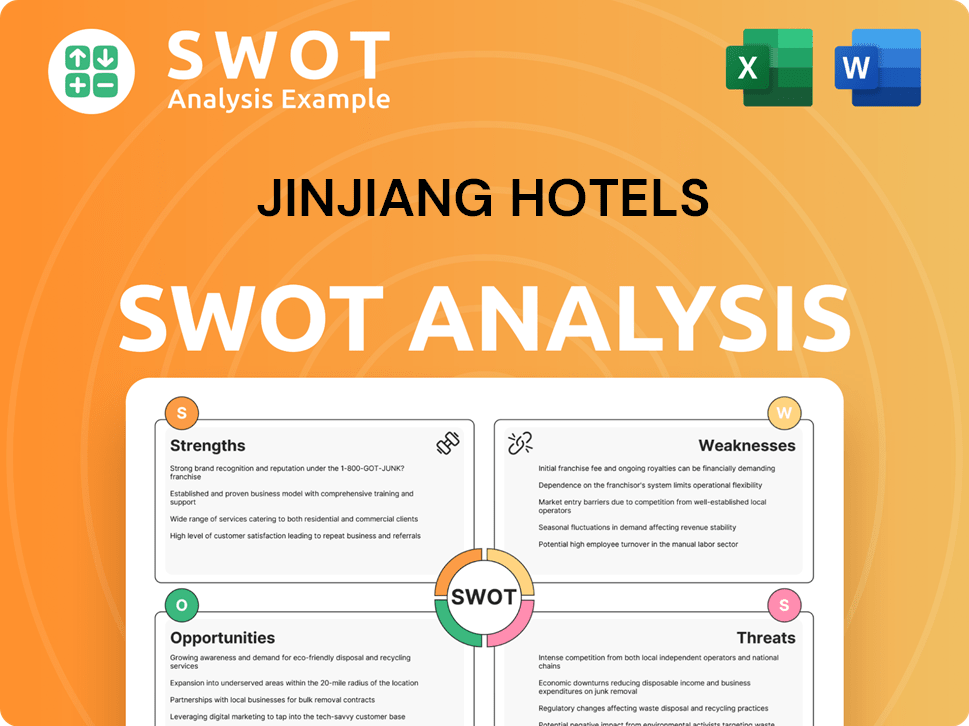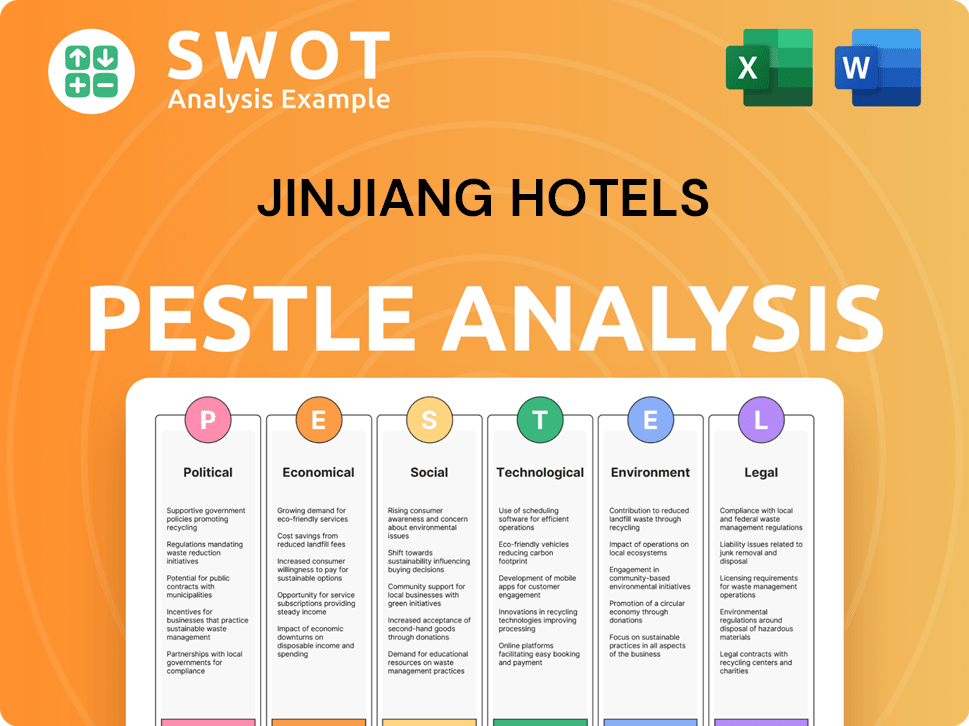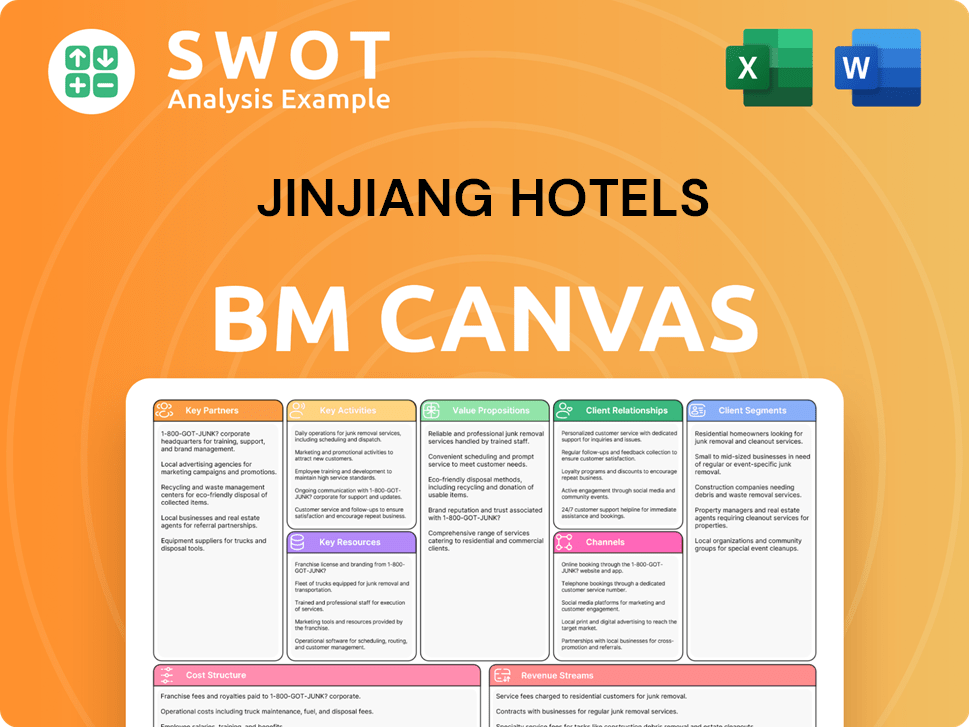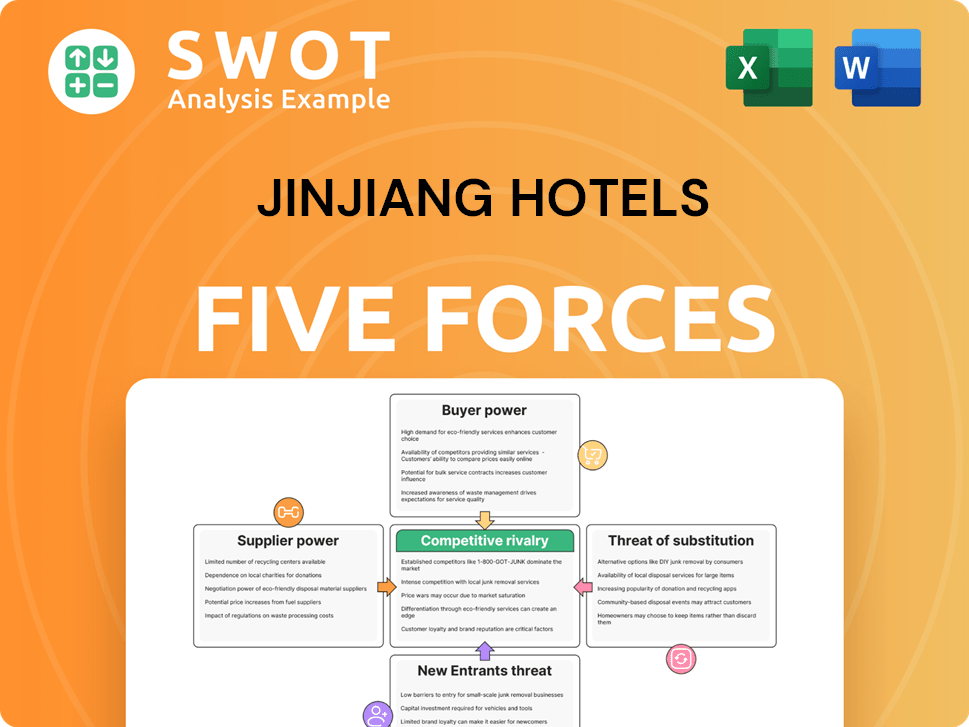JinJiang Hotels Bundle
How Does JinJiang Hotels Conquer the Global Hospitality Market?
Explore the dynamic sales and marketing strategies propelling JinJiang International, one of the world's largest hotel groups, to global dominance. From its roots in the Chinese hotel market to its expansive international presence, JinJiang's journey is a masterclass in strategic growth and market adaptation. Discover the innovative tactics and campaigns that have fueled its expansion and brand building across diverse markets.

This analysis delves into the JinJiang Hotels SWOT Analysis, examining its evolving sales strategies, including its approach to the China hotel market and international expansion. We'll dissect the company's marketing plan, from digital marketing to customer acquisition strategies, revealing how JinJiang Hotels positions its diverse brands and drives revenue growth. Furthermore, this study examines its competitive analysis, target audience, and the impact of its social media marketing and online booking strategy, providing actionable insights into best practices for hotel sales and marketing.
How Does JinJiang Hotels Reach Its Customers?
The sales strategy of Jin Jiang International incorporates a blend of online and offline channels to reach its extensive customer base. Domestically, the company leverages its own brands and booking platforms. Internationally, subsidiaries like Radisson Hotel Group and Louvre Hotels Group are key to its global reach through their distribution networks. This approach is crucial for expanding revenue streams and enabling rapid market entry, particularly in regions with high barriers.
The company's shift towards a 'light asset' model, focusing on management contracts and franchising, has been pivotal in its expansion. E-commerce platforms and the company's websites, including WeHotel Global Tour Shared Platform, serve as primary online booking channels. The physical presence of its hotels, totaling 13,416 operating hotels with 1,290,988 guest rooms by the end of 2024, acts as a direct sales point.
The evolution of these channels includes strategic moves towards digital integration and omnichannel experiences. For example, Jin Jiang Hotels (China) partnered with the Malaysian hotel management group RIYAZ by the end of 2024 to expand five brands into Southeast Asia. This partnership aims to have 108 hotels operational within five years across key growth markets.
Jin Jiang Hotels' digital marketing strategy focuses on e-commerce platforms and its websites for online bookings. The WeHotel Global Tour Shared Platform is a key component. This strategy reflects the industry's trend towards digital adoption and allows the company to reach a wide audience.
The physical presence of the hotels serves as a direct sales point. By the end of 2024, Jin Jiang had 13,416 operating hotels. This extensive network provides numerous opportunities for direct customer interactions and sales. This is a crucial part of their hospitality sales tactics.
Strategic partnerships, like the collaboration with Ascott Ltd, contribute to growth. The launch of NUO International Hotel Management Co. in early 2025 supports luxury brand expansion. The planned Hong Kong IPO in June 2025 is intended to provide strong support for Jin Jiang Hotels' overseas strategy and business implementation.
The partnership with RIYAZ aims to expand into Southeast Asia, targeting 108 operational hotels in five years. This expansion strategy focuses on key markets like Malaysia, Indonesia, and Vietnam. These moves are part of Jin Jiang Hotels' expansion strategy.
Jin Jiang Hotels' sales strategy combines online and offline channels to maximize market reach. The company focuses on digital integration, strategic partnerships, and expansion into key growth markets. This approach supports their overall brand positioning strategy.
- Digital Marketing: Utilizing e-commerce platforms and websites for online bookings.
- Strategic Partnerships: Collaborations to boost market share and expansion.
- Expansion: Targeting key markets, particularly in Southeast Asia, for growth.
- Financial Strategy: The planned Hong Kong IPO in June 2025 to support overseas strategy.
- Franchising: Prioritizing management contracts and franchising.
JinJiang Hotels SWOT Analysis
- Complete SWOT Breakdown
- Fully Customizable
- Editable in Excel & Word
- Professional Formatting
- Investor-Ready Format

What Marketing Tactics Does JinJiang Hotels Use?
The marketing tactics employed by Jin Jiang International are multifaceted, combining digital and traditional approaches to boost brand awareness, generate leads, and drive sales. Their strategy leverages a variety of digital tools and traditional methods to reach a broad audience. This comprehensive approach is crucial for maintaining a strong presence in the competitive China hotel market.
Digital marketing plays a significant role, focusing on data-driven campaigns, customer segmentation, and personalization. Traditional methods, such as events and partnerships, also contribute to their overall marketing strategy. The company's 'WeHotel Global Tour Shared Platform' likely serves as a central hub for digital marketing efforts, enabling targeted campaigns and customer relationship management.
Recent initiatives and collaborations highlight Jin Jiang's commitment to innovation and sustainability, which are key components of their marketing messages. These efforts aim to appeal to a wide range of customers, including environmentally conscious travelers. Understanding and catering to various customer segments is a key aspect of the JinJiang Hotels marketing plan.
The company focuses on digital marketing, including content marketing, SEO, paid advertising, email marketing, and social media engagement. This is crucial for a strong online presence. The 'WeHotel Global Tour Shared Platform' supports these efforts.
Traditional media, such as events and partnerships, also play a role in Jin Jiang's marketing strategy. An investor conference and launch event is scheduled for August 27, 2025, in Malaysia. This event will also introduce the Jin Jiang Global Purchasing Platform in Southeast Asia.
In August 2024, a joint venture was formed with NIP Group to develop e-sports-themed hotels. This demonstrates an experimental strategy to tap into niche markets. This is a part of JinJiang Hotels sales strategy.
Jin Jiang is collaborating with the World Travel & Tourism Council (WTTC) on the 'Hotel Sustainability Basics' initiative. A Memorandum of Understanding was signed with Accor in April 2023 to promote sustainable transformations. This is a key element of the JinJiang Hotels marketing strategy.
Jin Jiang's focus on platform synergy and exploring diversified business models, such as long-term rental apartments, indicates a strategic approach to understanding and catering to various customer segments. This is a key part of their customer acquisition strategies.
The broader industry trend suggests a focus on data-driven marketing, customer segmentation, and personalization. This approach allows for targeted campaigns and improved customer relationship management.
Jin Jiang International's marketing strategy combines digital and traditional methods to enhance brand awareness and drive sales. Their approach includes a strong emphasis on digital marketing, strategic partnerships, and sustainability initiatives. This comprehensive approach is designed to increase revenue.
- Digital Marketing: Content marketing, SEO, paid advertising, email marketing, and social media engagement.
- Traditional Marketing: Events, partnerships, and investor conferences.
- Innovative Partnerships: Joint ventures for niche markets, such as e-sports hotels.
- Sustainability Initiatives: Collaboration with WTTC and Accor to promote sustainable practices.
- Customer Segmentation: Understanding and catering to various customer segments through platform synergy and diversified business models.
JinJiang Hotels PESTLE Analysis
- Covers All 6 PESTLE Categories
- No Research Needed – Save Hours of Work
- Built by Experts, Trusted by Consultants
- Instant Download, Ready to Use
- 100% Editable, Fully Customizable

How Is JinJiang Hotels Positioned in the Market?
The brand positioning of the hotel group is built on a diverse portfolio, catering to a broad spectrum of travelers. Their strategy differentiates them through extensive reach and varied experiences across multiple brands. This approach allows the company to target its audience with a combination of value, accessibility, and an increasing focus on luxury and innovation. The company's ability to adapt to changing consumer preferences is key to its positioning.
The core message often revolves around providing comfortable and reliable stays, tailored to local preferences while maintaining international standards. For its luxury brands, the positioning emphasizes exclusivity and high-end experiences. The company's commitment to sustainability initiatives and proactive approach to environmental, social, and governance (ESG) factors enhances its brand image among increasingly conscious travelers. This commitment is a key element of its brand positioning strategy.
The company's growth strategy, as discussed in Growth Strategy of JinJiang Hotels, includes strategic partnerships and expansions to solidify its global presence and brand recognition. This expansion is crucial for maintaining a competitive edge in the China hotel market and globally. The company's marketing plan is designed to support this growth through consistent branding and targeted campaigns.
The target audience includes a wide range of travelers, from budget-conscious individuals to luxury seekers. Market segmentation is key to reaching diverse customer groups effectively. Understanding the needs and preferences of each segment allows for tailored marketing campaigns.
Brand consistency is crucial across all channels and touchpoints. Ensuring a unified brand experience helps build trust and recognition. This includes consistent messaging across digital marketing channels and in-person interactions.
A strong digital marketing strategy is essential for reaching a global audience. This includes online booking strategies, social media marketing, and search engine optimization (SEO). Effective digital campaigns drive customer acquisition and increase revenue.
Loyalty programs are a key component of customer retention. Analyzing and optimizing these programs can significantly impact customer lifetime value. Loyalty programs encourage repeat bookings and enhance brand loyalty.
The company uses several key strategies to enhance its brand positioning and achieve its goals. These strategies are essential for success in the competitive hospitality sales tactics landscape.
- Market Segmentation: Targeting specific customer groups with tailored offerings.
- Strategic Partnerships: Collaborating with other businesses to expand reach.
- Sustainability Initiatives: Focusing on ESG factors to attract conscious travelers.
- Digital Marketing: Utilizing online channels for customer acquisition.
- Loyalty Programs: Building customer retention through rewards.
JinJiang Hotels Business Model Canvas
- Complete 9-Block Business Model Canvas
- Effortlessly Communicate Your Business Strategy
- Investor-Ready BMC Format
- 100% Editable and Customizable
- Clear and Structured Layout

What Are JinJiang Hotels’s Most Notable Campaigns?
The sales and marketing strategy of Jin Jiang International centers on strategic partnerships and expansion initiatives rather than traditional campaigns. This approach aims for long-term growth and market penetration, focusing on both regional expansion and brand-specific launches. These efforts are crucial for enhancing brand visibility and driving revenue in the competitive China hotel market and beyond.
A key element of the Jin Jiang Hotels marketing plan involves leveraging partnerships to extend its reach. The company has strategically aligned itself with other industry leaders and regional players to bolster its market presence. These collaborations are designed to enhance customer acquisition strategies and improve the overall performance of the hotel chain.
Recent developments highlight Jin Jiang’s commitment to sustainable practices and asset-light expansion models. These strategies aim to appeal to a broader audience and capitalize on emerging market opportunities. By focusing on these initiatives, Jin Jiang is working to solidify its position in the hospitality industry.
The joint venture with RJJ Hotels Sdn Bhd, announced in May 2025, allows for the expansion of five Jin Jiang brands across Southeast Asia. The goal is to sign 181 hotel management agreements and have 108 hotels operational within five years. This includes properties in Malaysia, Indonesia, Vietnam, the Philippines, Cambodia, and Laos, with the first Metropolo property in Luang Prabang, Laos, scheduled to open in early 2026.
The launch of NUO International Hotel Management Co. in early 2025 is dedicated to expanding luxury brands like NUO, Ahn Luh, and Jianguo Hotel, as well as Kempinski. This initiative aims to strengthen Jin Jiang's presence in the upscale and luxury segments, catering to a specific target audience.
The partnership with Ascott Ltd, announced in October 2024, focuses on developing Quest and Tulip Lodj aparthotels in China. The TULIP LODJ Wuhan Wusheng Road property has maintained an occupancy rate of over 90%, demonstrating the success of this model. This approach supports urban renewal while expanding the hotel chain's footprint.
A collaboration with Accor, formalized in April 2023, promotes sustainable transformations and aims to reduce carbon emissions across the hospitality industry by 2030, with a goal of carbon neutrality by 2060. Participation in the WTTC's 'Hotel Sustainability Basics' highlights a commitment to responsible practices. This is part of the JinJiang Hotels sales strategy.
Jin Jiang's approach focuses on strategic partnerships and brand-specific launches to achieve market penetration. These initiatives are key components of their JinJiang Hotels marketing strategy. To better understand the company's target market, consider reading about the Target Market of JinJiang Hotels.
- Expansion into Southeast Asia with RJJ Hotels.
- Launch of NUO International for luxury brand growth.
- Asset-light expansion through partnerships with Ascott Ltd.
- Commitment to sustainability through collaboration with Accor.
JinJiang Hotels Porter's Five Forces Analysis
- Covers All 5 Competitive Forces in Detail
- Structured for Consultants, Students, and Founders
- 100% Editable in Microsoft Word & Excel
- Instant Digital Download – Use Immediately
- Compatible with Mac & PC – Fully Unlocked

Related Blogs
- What are Mission Vision & Core Values of JinJiang Hotels Company?
- What is Competitive Landscape of JinJiang Hotels Company?
- What is Growth Strategy and Future Prospects of JinJiang Hotels Company?
- How Does JinJiang Hotels Company Work?
- What is Brief History of JinJiang Hotels Company?
- Who Owns JinJiang Hotels Company?
- What is Customer Demographics and Target Market of JinJiang Hotels Company?
Disclaimer
All information, articles, and product details provided on this website are for general informational and educational purposes only. We do not claim any ownership over, nor do we intend to infringe upon, any trademarks, copyrights, logos, brand names, or other intellectual property mentioned or depicted on this site. Such intellectual property remains the property of its respective owners, and any references here are made solely for identification or informational purposes, without implying any affiliation, endorsement, or partnership.
We make no representations or warranties, express or implied, regarding the accuracy, completeness, or suitability of any content or products presented. Nothing on this website should be construed as legal, tax, investment, financial, medical, or other professional advice. In addition, no part of this site—including articles or product references—constitutes a solicitation, recommendation, endorsement, advertisement, or offer to buy or sell any securities, franchises, or other financial instruments, particularly in jurisdictions where such activity would be unlawful.
All content is of a general nature and may not address the specific circumstances of any individual or entity. It is not a substitute for professional advice or services. Any actions you take based on the information provided here are strictly at your own risk. You accept full responsibility for any decisions or outcomes arising from your use of this website and agree to release us from any liability in connection with your use of, or reliance upon, the content or products found herein.